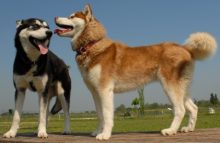Siberian Husky
Lifestyle Needs

The Siberian Husky is a long distance sled dog and as such does not make a very suitable household pet. He wants to pull something and will not enjoy being walked on the lead. He is also a hunter and will pursue any small animal. He loves humans but his strength and exuberance allows him to jump over fences, dig his way out and escape to chase whatever it is he’s after. He loves a cold climate and his thick coat will keep him warm and dry in all weathers. He is also typically very noisy.
Genetic Diversity
(Known as Coefficient of Inbreeding: 'COI'. It should be as low as possible.)
The UK Kennel Club breed average COI is 6.2% - See 'A Beginners Guide to COI'
Gene Pool Size
(Known as Effective Population Size: 'EPS')
142.9
EPS is a measure of how many individuals are contributing genetically to a breed population. It is a measure of the size of the gene pool in a breed. Lower than 100 is considered critical by conservationists and below 50 brings a breed close to extinction. For more information see the Kennel Club article.
Health and Welfare Problems due to Conformation
(Body shape and physical characteristics)
The Husky’s thick coat means that he is not suited to a warm climate and will suffer if the weather is warm.
BVA/KC Health Schemes: www.bva.co.uk/chs
- Eye disease: Goniodysgenesis / Primary glaucoma (G) (annual testing); Hereditary cataract (HC) (annual testing)
- Hip dysplasia: breed 5 year mean score 6.3 (parents should be lower)
Estimated Breeding Values (EBVs) : EBVs for Hip Dysplasia are available for this breed
www.thekennelclub.org.uk/about-ebvs
DNA Tests Available
DogWellNet and IPFD Harmonisation of Genetic Testing for Dogs (HGTD)
www.dogwellnet.com/breeds
- Cone Degeneration (Achromatopsia)
- Dihydroxyadenine Urinary Stones
Availability of a DNA test does not mean that it is always necessary or even desirable for breeders to use this test.
Other Breed-Specific Health Screening Schemes
- Breed club – Eye testing.
Ask the breeder to show you the certificates for the above tests/screening for both parents. If any of the above tests have not been considered necessary by the breeder (and there may be good reasons), ask her to explain why.
Other Diseases Reported
(For which there are currently no genetic or screening tests for sire or dam)
- Epilepsy
- Bloat / Gastric Torsion
- Cataract
- Zinc responsive dermatosis
- Endocrine alopecia
- Cancer
- Glaucoma
- Hypothyroidism
Ask the breeder about the medical history of the parents, grandparents and great grandparents. Consider carefully whether to purchase a puppy if some of these or other diseases are in the family line.
Ask about the breeder’s policy in cases of serious genetic diseases occurring to your puppy in later life. Good breeders will request to be informed of such events in order to improve future breeding decisions.
You are strongly advised to buy from a breeder who uses (or is prepared to use) the AWF Puppy Contract and Puppy Information Pack (PIP): www.puppycontract.org.uk
The breeder should also be familiar with the CFSG/DBRG Code of Practice for Dog Breeding